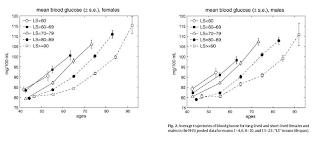Filet mignon is one of the tenderest cuts of beef. It is also one of my favorites. Filet mignon comes from the tenderloin area (see this picture), which is not a weight-bearing area and thus is very tender. The bison cuts I get here in South Texas are close in terms of tenderness, but not as tender, probably because they are from the round area.
One steak of either filet mignon or bison will yield about 100 g of cooked meat, with 30 g of protein and 10 g of fat. About half of that fat will be saturated and half monounsaturated (as in olive oil). It will provide you with plenty of vitamins (particular B vitamins) and minerals. Good amounts of selenium, phosphorus, zinc and potassium.
On the photo below (click on it to enlarge), the bison steak is at the top. The other pieces are all filet mignon cuts. They are all medium-cooked. I cooked two plates of these, for 6 people. All ate to satisfaction, with a side salad. The leftovers are delicious for breakfast in small amounts.
For the filet mignon, I think you really have to go to a specialty meats store (butcher) and make sure that they cut the smaller tail end of the tenderloin muscle. You will be paying a lot for it, so it makes sense to be choosy. Experience butchers will cut it right in front of you and won’t mind your choosiness.
Below is a simple recipe; simple like most of the recipes on this blog. I like my meals quick and delicious.
- Prepare some dry seasoning powder by mixing sea salt, garlic power, chili powder, and a small amount of cayenne pepper.
- Season the steaks at least 2 hours prior to placing them on the grill.
- Grill with the lid on, checking the meat every 10 minutes or so. (I use charcoal, one layer only to avoid burning the surface of the meat.) Turn it frequently, always putting the lid back on.
- If you like it rare, 20 minutes (or a bit less) may be enough.
These are as tender as any piece of beef can possibly get. No need for any tenderizer juices during seasoning. If you are doing both filet mignon and bison together, either eat only bison or bison first. Because once you taste the filet mignon, the bison cut may taste a bit hard!
For me the filet mignon is a 10-dollar per pound treat for special occasions. The price of the bison cut is about the same, at least here in Laredo, Texas, where I get it shipped from Dakota via my local supermarket. You can also get it online.
By the way, some folks like to say that bison is the “salmon of the prairie”. This is in reference to bison’s omega-3 content. Well, here is the polyunsaturated fatty acid composition of 100 g of bison steak: 29 mg of omega-3, and 197 mg of omega-6. For salmon it is 1424 mg of omega-3, and 113 mg of omega-6.
Salmon of the prairie or not, I love it!
One steak of either filet mignon or bison will yield about 100 g of cooked meat, with 30 g of protein and 10 g of fat. About half of that fat will be saturated and half monounsaturated (as in olive oil). It will provide you with plenty of vitamins (particular B vitamins) and minerals. Good amounts of selenium, phosphorus, zinc and potassium.
On the photo below (click on it to enlarge), the bison steak is at the top. The other pieces are all filet mignon cuts. They are all medium-cooked. I cooked two plates of these, for 6 people. All ate to satisfaction, with a side salad. The leftovers are delicious for breakfast in small amounts.
For the filet mignon, I think you really have to go to a specialty meats store (butcher) and make sure that they cut the smaller tail end of the tenderloin muscle. You will be paying a lot for it, so it makes sense to be choosy. Experience butchers will cut it right in front of you and won’t mind your choosiness.
Below is a simple recipe; simple like most of the recipes on this blog. I like my meals quick and delicious.
- Prepare some dry seasoning powder by mixing sea salt, garlic power, chili powder, and a small amount of cayenne pepper.
- Season the steaks at least 2 hours prior to placing them on the grill.
- Grill with the lid on, checking the meat every 10 minutes or so. (I use charcoal, one layer only to avoid burning the surface of the meat.) Turn it frequently, always putting the lid back on.
- If you like it rare, 20 minutes (or a bit less) may be enough.
These are as tender as any piece of beef can possibly get. No need for any tenderizer juices during seasoning. If you are doing both filet mignon and bison together, either eat only bison or bison first. Because once you taste the filet mignon, the bison cut may taste a bit hard!
For me the filet mignon is a 10-dollar per pound treat for special occasions. The price of the bison cut is about the same, at least here in Laredo, Texas, where I get it shipped from Dakota via my local supermarket. You can also get it online.
By the way, some folks like to say that bison is the “salmon of the prairie”. This is in reference to bison’s omega-3 content. Well, here is the polyunsaturated fatty acid composition of 100 g of bison steak: 29 mg of omega-3, and 197 mg of omega-6. For salmon it is 1424 mg of omega-3, and 113 mg of omega-6.
Salmon of the prairie or not, I love it!


 :.
:.

 7:21 PM
7:21 PM
 Unknown
Unknown






























